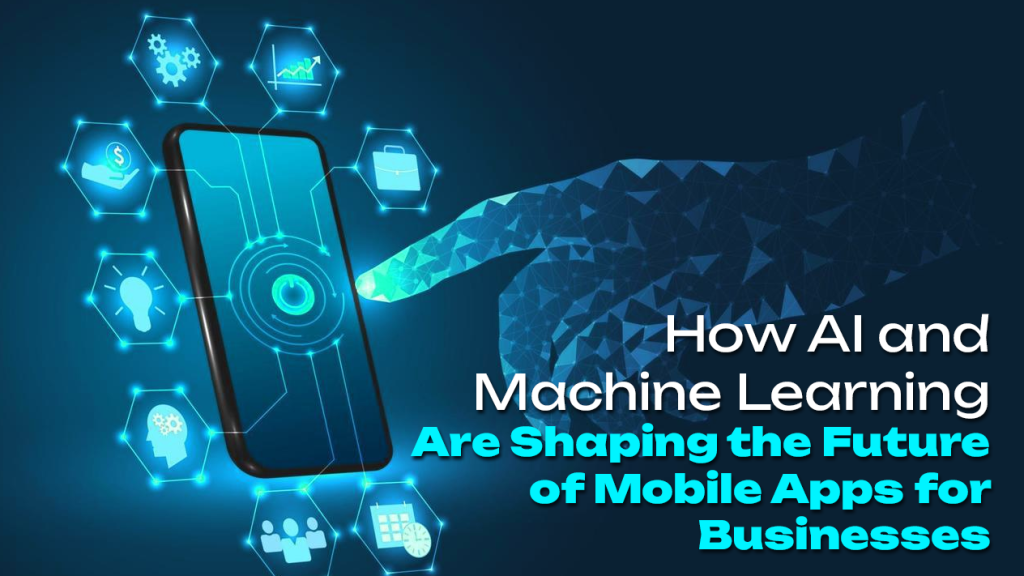- Digital Transformation
- Brand Awareness
- 5X ROI
- Online Visibility
- Performance Marketing
- Customer Engagement
- More Sales
- Search Dominance
- More Leads
- Digital Transformation
- Brand Awareness
- 5X ROI
- Online Visibility
- Performance Marketing
- Customer Engagement
- More Sales
- Search Dominance
- More Leads

The rise of Artificial Intelligence (AI) and Machine Learning (ML) is transforming industries, and mobile apps are at the forefront of this revolution. In a world where personalized experiences, real-time responses, and predictive capabilities are essential to customer satisfaction, AI and ML are becoming integral to the success of mobile applications for businesses.
From improving user experiences to enhancing customer service and marketing strategies, AI and ML are enabling businesses to create more intelligent, dynamic, and adaptive mobile apps. In this blog, we’ll explore how AI and machine learning are shaping the future of mobile apps, android apps and how businesses can leverage these technologies to engage customers, improve efficiency, and drive global success.
The Growing Role of AI in Mobile Apps
AI in mobile apps refers to the incorporation of technologies like machine learning, natural language processing (NLP), and computer vision to make apps more intelligent and adaptive. These technologies allow apps to analyze data, learn from interactions, and offer personalized experiences, ultimately enhancing customer satisfaction.
Mobile app developers are increasingly integrating AI into apps for various business purposes, making mobile experiences smarter, more intuitive, and more responsive. With AI’s ability to process and analyze vast amounts of data quickly, mobile apps are becoming more capable of offering personalized features and functionalities that were once unthinkable.
Personalizing Mobile Experiences with AI
In today’s competitive business landscape, personalization is key to building customer loyalty. AI allows mobile apps to gather and analyze user data, which helps businesses deliver tailored experiences to individual users. Whether it’s recommending products, suggesting services, or customizing content, AI can significantly enhance user engagement by offering experiences that feel more relevant and connected to the user.
For example, in e-commerce apps, AI-driven recommendation engines analyze users’ browsing and purchase history to suggest products they might be interested in. These personalized recommendations not only increase customer satisfaction but also encourage repeat purchases, ultimately driving higher conversion rates.
Moreover, AI in mobile application development can adapt to users’ preferences over time. The more a user interacts with the app, the more it learns about their needs, improving the overall experience. This continuous learning creates a feedback loop where the app becomes more accurate and efficient in delivering personalized content.
AI-Driven Customer Service: The Role of Chatbots
Customer service is another area where AI is making a significant impact. Businesses are increasingly using AI-powered chatbots within mobile apps to provide instant, 24/7 support to users. These AI-driven assistants can handle a wide range of customer inquiries, from answering frequently asked questions to troubleshooting technical issues.
The key advantage of using AI-driven chatbots is that they can quickly respond to user queries without human intervention, ensuring that users receive prompt assistance. Furthermore, chatbots can use natural language processing (NLP) to understand and respond in a conversational tone, making the interaction feel more human-like and enhancing customer satisfaction.
In addition to responding to customer inquiries, AI chatbots can also anticipate customer needs. For example, they might suggest relevant products based on the user’s browsing history or offer helpful tips based on the user’s interactions with the app. This proactive approach creates a more personalized experience and strengthens the relationship between the customer and the business.
Predicting User Behavior for Targeted Marketing
AI and machine learning are playing a pivotal role in shaping how businesses target their marketing efforts. By analyzing large amounts of user data, AI algorithms can identify patterns and predict user behavior, helping businesses make data-driven decisions about how to market to their customers. This predictive capability can be a game-changer for businesses looking to optimize their marketing strategies.
For example, machine learning algorithms can analyze users’ previous interactions with a mobile app and predict when they are most likely to make a purchase, or what types of promotions they might respond to. By understanding user behavior patterns, businesses can tailor marketing messages to be more relevant and timely, improving the effectiveness of campaigns.
AI-powered mobile apps can also help businesses segment their audience more effectively. Instead of treating all users the same, businesses can use AI to create customer personas based on factors like location, age, purchase history, and preferences. With this information, businesses can deliver targeted marketing messages that resonate with specific groups, increasing the chances of conversion.
Enhancing Mobile App Security with AI
Security is always a top concern for mobile app users and businesses alike. AI and machine learning can play a key role in enhancing the security of mobile apps by detecting and responding to potential threats in real-time. For example, AI algorithms can monitor app behavior to identify suspicious activity, such as unusual login attempts or unauthorized transactions, and flag them for review.
AI-driven mobile apps can also use biometric authentication (like facial recognition or fingerprint scanning) to ensure secure access to user accounts. By continuously learning from user behavior, AI can also improve its ability to recognize anomalies and prevent fraud, further bolstering app security and providing users with peace of mind.
AI and ML Mobile App Trends for 2025
As AI and machine learning continue to evolve, several trends are shaping the future of mobile application development . In 2025, businesses will see even more advanced applications of these technologies:
1. Hyper-Personalization
AI will continue to drive deeper levels of personalization. As businesses gather more data about users, they will be able to offer highly personalized experiences—whether it’s tailoring content, product recommendations, or even user interfaces to match individual preferences.2. Voice Assistants and Natural Language Processing (NLP)
Voice-controlled apps and virtual assistants are becoming more common, and in 2024, NLP will become even more sophisticated. Businesses will integrate AI-driven voice assistants into their apps to allow users to interact with their devices hands-free, improving accessibility and convenience.3. AI for Visual Search
AI-driven visual search capabilities are expected to grow in 2024. Apps can allow users to take pictures of items they are interested in, and AI can help them find similar products or services online. This is particularly valuable for e-commerce apps, where product discovery plays a key role in customer engagement.4. Augmented Reality (AR) and AI Integration
AI will enhance AR apps, creating even more immersive experiences for users. For example, businesses can integrate AI to improve product visualizations or create virtual try-ons, allowing users to interact with products in a more engaging and realistic way
The Future of AI and Machine Learning in Mobile Apps
As AI and machine learning technologies continue to advance, their potential for transforming mobile app development is limitless. Businesses across industries, from retail to healthcare to finance, are increasingly adopting AI-driven mobile apps to enhance user experiences, streamline operations, and improve customer engagement.
By leveraging AI and machine learning in their mobile apps, businesses can create more personalized, intuitive, and responsive experiences for their users, improving customer satisfaction and fostering loyalty. Moreover, the predictive capabilities of AI and machine learning allow businesses to fine-tune their marketing efforts, ensuring that they connect with users in meaningful ways.
Incorporating AI and machine learning into mobile apps is not just a trend—it is an essential strategy for businesses looking to thrive in the digital age. By adopting these technologies today, businesses can position themselves for success in the global market tomorrow.
Category
Latest Blogs
Looking for Certified & Experienced Developers
- Flexible Engagement
- NDA Protection
- 100% Satisfaction
- 24X7 Support
- Moneyback Guarantee
Newsletter for News and Latest Updates
Have a Project?
Let’s talk!
- NDA? Absolutely just ask.
- We’ll respond in 24 hours fast & focused.
Prefer email?
info@baniwalinfotech.com
